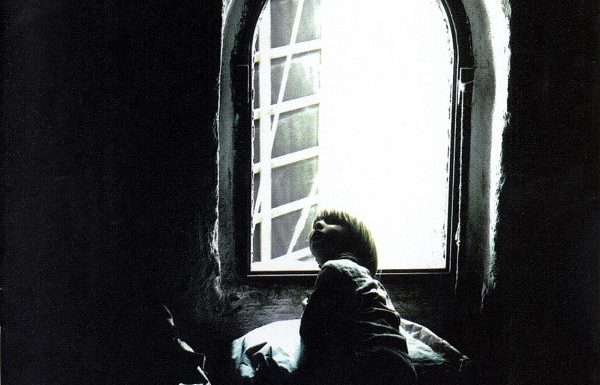

Edward Ka-Spel’s brilliance with The Legendary Pink Dots is to introduce us to isolated characters and then immerse us in their world-view through expansive and mysterious soundscapes. He begins with the most restricted, infinitesimal point of consciousness and then slowly expands it outward towards a state of ‘cosmic consciousness’ (to use the phrase of 1960s psychonauts). Musically, he often follows this template of expansion, with simple melody lines repeating and layering in increased complexity of texture. Much of the LPD’s music is an undertaking to help the listener (and perhaps composer) escape his/her own head. Lyrical phrases, musical motifs, album titles and themes recur across decades, but tonal shifts between albums are slow and subtle. Hopefully, The Legendary Dots Project, like the Residents and Sparks projects before, will provide the keen reader and listener with a giddy entry-point into the Legendary Pink Dots’ musical world. Fulfil the prophecy!
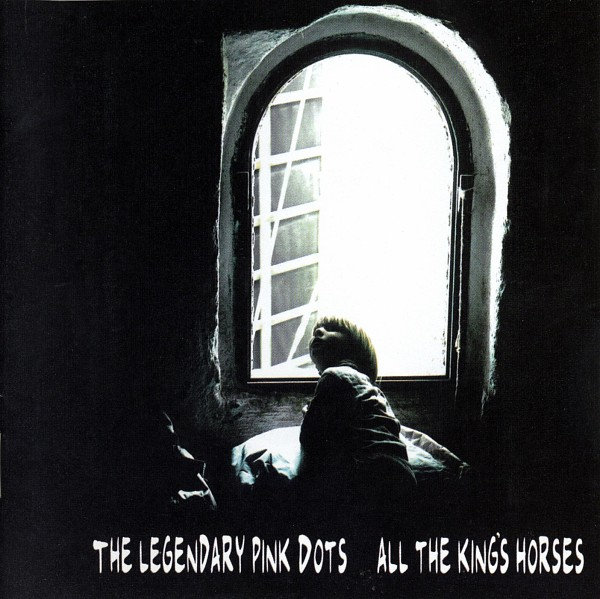
Tom: A child looks up out of a window in a potentially eerie image, which seems an unusually bare tabula rasa for the Dots. Semi-everyday, hinting at, but not achieving, the enigmatic. In a different context, the plural phrase “all the kings” featured in ‘The Light in My Little Girl’s Eyes’ (1983; 1988) as an indistinct gaggle of monarchs. Here, it uses the genitive to show possession. These 12 musical horses connect to power in a diffuse way, but at least two songs make tangible references to despotic rulers.
2002 was a strange old year. In my second year at Uni, which pretty much started simultaneously with this album’s 1 October release, I threw myself into life more, the retrospectively necessary path of making mistakes in order to at least learn, slightly. While I did a fair lot, there was such a hedonistic cultural mood at that time that you were made to feel it was never quite sufficient. I’ll certainly never be a puritan, but surely we want pleasure to feel like pleasure and not like an obligatory hedonic treadmill, to quote Mark Fisher.
1. ‘The Unlikely Event’ – This seems Midi-led and a very basic production, symbolised by the bare percussion sound. Black gold, oil, Texas, “your secret lover”, it all evokes the key melodramatic soap Dallas (1978-91). This feels a curio, again reiterating the “be who you want to be” line, that key repetitive line of the high neoliberal era. This has a gently ruminative melancholy, I quite like it but it doesn’t thrill or exert a vice-like compulsion.

2. ‘The Way I Feel Today’ – “It’s what you are, not who you are”, Ka-Spel asserts. “To hell with dignity, those grand illusions”. Horns and fuzzy guitars carry us into more frenetic waters. It feels fairly small fry, sonically.
3. ’12th’ – This is a somewhat more engaging rueful violin scored tune. “This one’s for Guy Schlesinger, a jovial young messenger”. This is delicate, ashen stuff; the album moves up a gear, in what feels like a low-key revisiting of ‘New Tomorrow’.
4. ‘Our Dominion’ feels like one of the most wistful early VDGG or King Crimson songs, guitar-led, an existential Gothic folk music. Wan flute and pallid organ join in, there’s mockery of religion, as so often Catholicism – clear through the naming of the filthily rich “Pope Pius Avocado III” – and a serene ode to a sense of refuge for a couple of lovers. Outside irritations keep creeping in, while it is Pius’s dominion.
5. ‘Chain Surfing’ refers to an insomniac, the fridge is empty, nothing’s on TV. References to a PC in a Dots song sounds odd, where he sees pictures of Madagascar. This song evokes the distended oddity, great possibilities and rabbit hole dangers of the internet. It has a cantering, oddly pacific feel, with guitar, synth and saxophone.
6. ‘Just Wave’ is lovely, and at 3 mins 47 secs, it feels like an interlude for the Dots. It evokes the sort of melancholy minor key instrumental I often gravitated to at this time on varied electronica releases from Plone, Aphex Twin, Mark Van Hoen. This could easily make nuanced, forlorn backing for a weird sketch on Chris Morris’s early hours BBC Radio 1 experience Blue Jam (1997-99), or to provide a suitably melancholy mood for the ruminations in the equally fantastic and genre pigeonhole-defying TV show How To With John Wilson (2020- ). The rhythm is a deft ticking metronome. It marks a fine segue into…

7. ‘It’s the Real Thing’, the first real centrepiece of All the King’s Horses. Hazy, wispy keyboard and guitar beckon in Ka-Spel, who delivers a monologue from the interior perspective of a cynical Western visitor or tourist within a Third World country. Mysterious whisperings: “never take their word, deep down they know they’re here to serve some King…” Or is that last phrase “SUN KING”, i.e. Louis XIV. Either way, it is a striking line. Then there is a sardonically grandiose musical section, followed by more anguished vocals. “Natives gallop over mines like it was Marlboro Country”, which evokes the imperialistic undertow of the famous Western themed 1960s advert. “Bwana” indicates this is East Africa… “Brandy on the rocks, shrunken head packed in a box. Something to take home to mother!” This is brilliant, distilling the Dots’ macabre absurdity with precise references to the iconographic power of monarchy or advertising. All contained within a deftly, questioning musical cocoon.
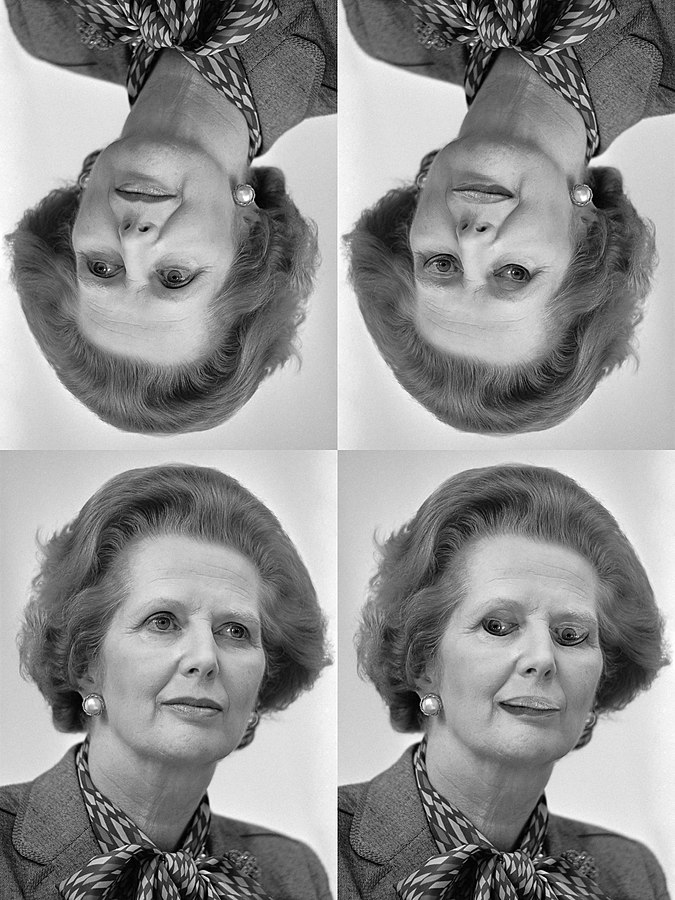
8. ‘A Bargain at Twice the Price’ presents us with the Thatcher “crime is crime is crime” sample from 21 years ago, distorted and messed around more than ever, righteously so. Ka-Spel speaks of a shrinking planet, packed outside, creeps closer, faces pressed against the window. Claustrophobic planetary consciousness, the global village crowded in the extreme. Electric guitar, lyrically Fripp-esque, combines well with more of that saxophone. There are references to “low-lives” from the narrator, the desire for refuge – at least somewhat romantic in ‘Our Domnion’ – now seems ever more akin to eugenics. This curdled worldview seems unmistakable here, as the Thatcher voice comes back into auditory view at 6 minutes. Brought chillingly to mind is Keith Joseph’s infamous pro-eugenics speech in Birmingham on 19 October 1974, which doesn’t get bracketed enough alongside Powell’s shit-stirring racist oratory in the same city six years earlier.
9. ‘Daisy’ is a 42-second music hall canter, the freak show or cinema of attractions. It sounds like a 1930s sample mixed with Residents-like sound effects. “Daisy gave us daisies on a daily basis, that’s so nice”. Deceptively innocent or just innocent?
10. ‘Birdie’ is an extraordinary six minutes. I’m going to stick my neck out here – right here and right now! – and call it one of my favourite of all Dots songs so far. Reverberating guitar and saxophone led. It is wonderful to hear such rich saxophone playing, as an intrinsic voice here rather than extrinsically shoehorned in as in so many of 1993’s UK Top 75 Singles, which I listened to and wrote about here. There, faked attempts at punctum, here a transporting force. Amid a tale of ominous exodus. The tremendous, King Lear Act 5 citing chorus recurs innumerably: “Still, I’ll sing for you, sing for you, so pretty in my [this] cage, I will sing for you, I’ll sing for you, Be patient, it’s a sad song”. The verses delineate materialist products amid cataclysmic events involving red on the streets and invoking an enigmatic “Captain Thunder”. The role of “me”, getting elided. Verdant guitar and saxophone play as beats scatter with delay applied to lend a dub reggae undertow.
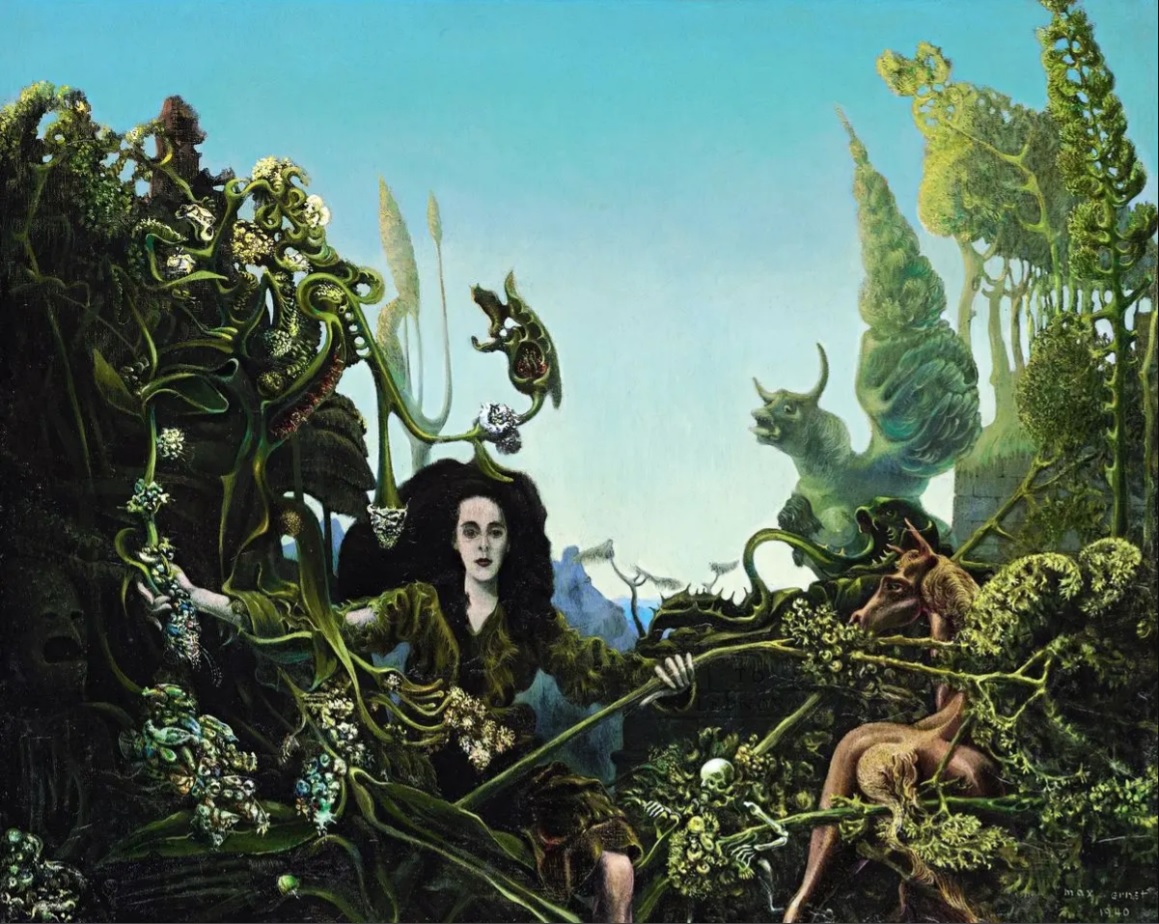
11. ‘Lisa Goes Surfing’ is twinkling with mandolin opening, joined by horns. Body falling apart, my dying wish is “freeze me”. This feels old-time, paralleling some of the Dots’s strange sea shanties. Ka-Spel’s alter ego is an “ancient princess”, inhabiting an aqueous drowned world. This is a good track, if somewhat overshadowed by those either side of it.
12. ‘Wax and Feathers’ opens with a leisurely, submerged beat, low BPM, with more languid saxophone. The city slumbers. Submerged indistinct European voice sampled. “Sure I’ve read the history books, it’s why I fly by night. It’s why you locked me in the closet, all the faceless men in white”. It’s a strange magic realism of a birdman accompanied by suitably occasionally faster synth arpeggios. It ends with an awed science fiction take-off. The final Fairlit-evoking vocal resounds like a barely recognisable, truncated breath from “Sing While You May”.
This album is a remarkable one in how much it improves following a fairly underwhelming opening. There are at least four utter LPD classic songs on here, which chart new strange territory. It feels utterly timeless, evoking mind’s eye imagery from Max Ernst and Ray Harryhausen, while feeling Shakespearean in highlighting human frailty, following earlier dark visions of the Sun King.
It becomes an awesomely chilling menagerie, with consumer detritus, Margaret Thatcher, eugenics and despotism close to the surface, while Lisa is beneath the iceberg.

Adam: All the King’s Horses is a very fine album, musically positioned halfway between the horns-embellished folk of Hallway of the Gods (1997) and the weird psych-rock of The Maria Dimension (1991). My personal feeling it that it could be trimmed by about 10 minutes to make a truly excellent album, probably leaving off the first couple of tracks that Tom was less enamoured by. While there is a thematic thread that runs throughout – roughly, power as it exists in relation to space and place – this is definitely a collection of songs rather than a cohesive suite or concept album.
I’m in complete agreement with Tom that ‘Birdie’ is the album’s centrepiece, though it only truly enraptures me in its last quarter, when Niels van Hoorn’s saxophone and Martijn de Kleer’s guitar wind around each other in a giddy double-helix, leading the listener up a twisted ladder into a state of sonic bliss! [Okay, my purple prose is somewhat overselling the fact, but Tom is not wrong to rate the track so highly]. Indeed, van Hoorn and de Kleer never risk sounding like they are merely embellishing Ka-Spel and Knight’s songwriting on this album. As was the case on From Here You’ll Watch the World Go By (1995) the band sounds like a cohesive unit here, which is not always the case on the Dots’s longer, experimental excursions like Chemical Playschool 11, 12 & 13 (2001) where I get the impression that Knight and Ka-Spel feel more able to indulge their individualist impulses between the studio jams.
While my personal preference will always be for Patrick Wright’s off-kilter, romantic-sardonic violin playing as the musical grit in the oyster that helped/helps mark out the Dots as different from other psych-rock bands in their second incarnation, van Hoorn and de Kleer are far from workmanlike. With van Hoorn’s playing, there is often an exciting push-and-pull between bathos and pathos… a winkingly inflated moment of pomp and circumstance will resolve into a soaringly wistful piece of brightly fluttering acoustics. Likewise, de Kleer can move from Snakefinger-like discordance to David Gilmouresque string bending with grace and fluency.
Personally, the lyrics to ‘Birdie’ don’t do much for me, partly because they put me in mind of Kurt Cobain’s lyrics to ‘Polly‘, one of my least favourite tracks by Nirvana. While Ka-Spel is one of my favourite lyricists, both as a social commentator and an explorer of innerspace, I find the lyrics on this album and A Perfect Mystery (2000) a little too abstracted… not gnomic exactly, but a trifle hazy and fragmentary. I also find this to be true of the lyrics used by many neo-psychedelic pop and rock groups, such as The Flaming Lips or Mercury Rev. I’ve not actually listened to much King Gizzard & the Lizard Wizard [who, with their extensive discography, probably deserve their own dedicated Project like The Residents, Sparks and Frank Zappa] but I’m willing to make a fair bet that they’re the same!
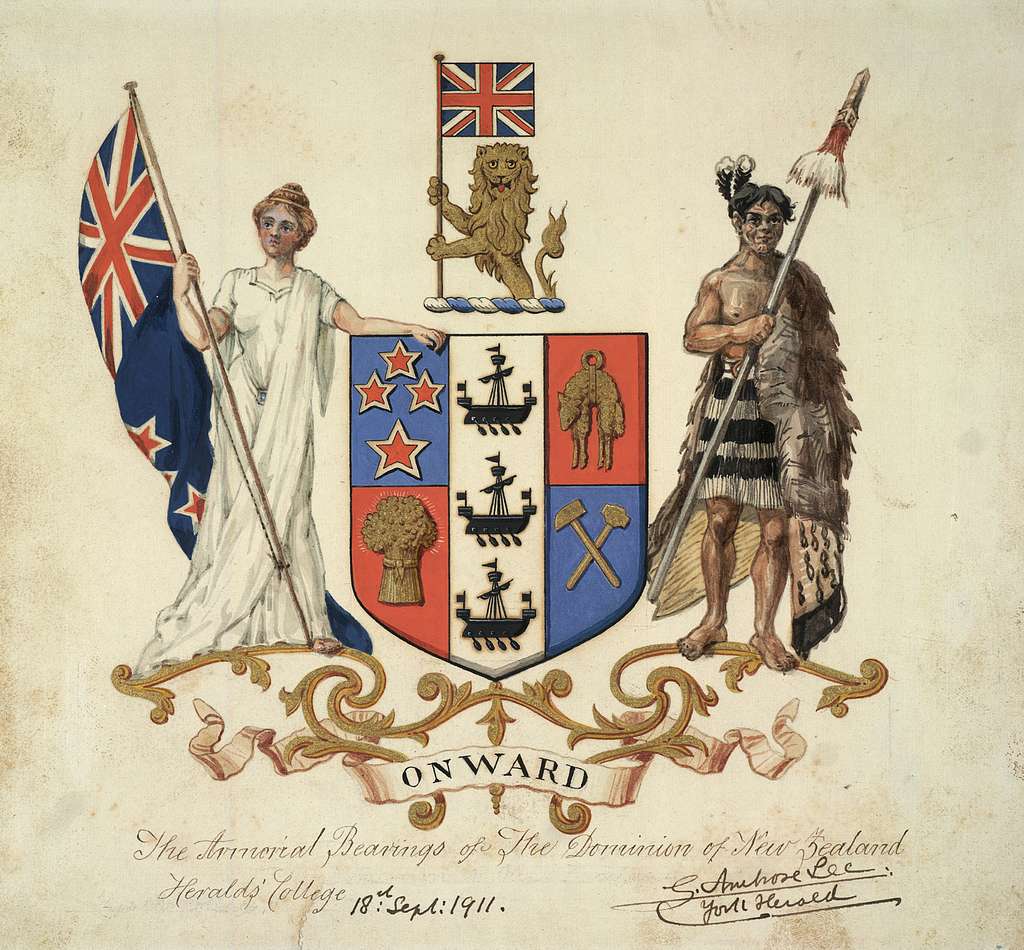
The other track which made the greatest impression on me lyrically is ‘Our Dominion’, a folksy story of a couple who keep trying to make a space for themselves only to find their plans interrupted. While I’ve never been a member of a touring band, I’ve largely spent my life away from my parents’ home in rented student accommodation or in a house that didn’t belong to me. Yi-Fu Tuan has written at length about the processes by which humans, as a meaning-making species, convert space into place. I think one of the reasons I spent so many years lugging about an entire library of books and DVDs when I moved into different accommodation was because I never felt like I had a place to call my own, only the accrued stuff which reflected my interests. The couple in ‘Our Dominion’ build a “cabin on a crest” but soon find it overwhelmed by silver-winged friends who move in, sleep besides the fire, and make the place their own. The couple face urbanisation and gentrification, and are relocated from their cabin to a cell. Even in the public space of the municipal park they find themselves confronted with “fence-to-fence aerobics”, suffering from the claustrophobia of crowds until they accept that the only home where they can find any kind of respite is within each other’s souls. Ultimately then, the song traces the opposite trajectory to the cynical ‘Shock of Contact‘ on Island of Jewels (1986) and a similar one to that sketched dreamily on Asylum’s (1985) ‘Golden Dawn‘.
Interestingly, ATKH was one of the first Dots albums originally issued with all its lyrics included alongside the CD because Ka-Spel was fed up with people transcribing and misinterpreting his words (//gulp//). He relates that the first track on the album, ‘The Unlikely Event’, was the first one written, eerily anticipating 9/11, in which a passenger on a crashing aeroplane phones his wife only to receive her answering machine (an event which seemed possible though unlikely to Ka-Spel back in 2001). While it is seemingly a coincidence that Ka-Spel wrote a song about a plane crash just months before the most famous two plane crashes in history would occur, the date of the album’s release made it inevitable that the song would be interpreted in that light, with some fans of the time apparently citing it as evidence of Ka-Spel’s prophetic abilities. Slotted (unfairly?) into this category, Ka-Spel’s tragic thought experiment stands the test of time better than other 9/11-inspired songs written in 2001, such as The Charlie Daniels Band’s ‘This Ain’t No Rag, It’s a Flag‘ or Toby Keith’s ‘Courtesy of the Red, White and Blue (The Angry American)‘; however, it feels very slight next to Sleater-Kinney’s rousing ‘Far Away‘ or even The Residents’ own introspective post-911 album Demons Dance Alone. Musically, the circling piano melody is chilling but not gripping. I think it needed more expansive productive and imaginative percussion to make an emotional impact… the references to Texan culture (and, elliptically, the JFK assassination in Dallas) actually obfuscate more than illuminate the concerns around technological alienation that are thinly sketched here. Still, as Ka-Spel feared, I may be completely misinterpreting his lyrics… a risk when historical events overtake a work of fiction.
I like the following track, the angular mini post-punk chamber piece (!) ‘The Way I Feel Today’, rather more, since Ka-Spel puts in a pleasingly strident performance against the skittish (yet regal!) instrumentation. As my bracketed exclamations imply, ‘The Way I Feel Today’ contains a set of musical (or generic) contradictions, and is almost two songs in one, leaping between Medievalist music box dirge and spiky goth freakout with cheerful abandon. This is probably too ambitious a fusion to achieve over less than four minutes, though was pulled off on songs of a similar length by Cardiacs on Little Man and a House and the Whole World Window (1988). Also, Wikipedia informs me that the first music box was manufactured circa 1885. This is true to Ka-Spel’s concept of the Dots’ music as a “terminal kaleidoscope” fusing together different historical moments in a simultaneous present… but post-punk gothic Medievalist Victoriana risks becoming steampunk, which very few bands (such as The Mechanisms) have pulled out without falling into kitsch. Ka-Spel is simply too sharp and slippery to fall into that trap completely, but the more limited the band’s production, the more the Yamaha fantasy patches potentially beckon!

More textured than the first two tracks is ’12th’, which is murky and mournful. Martijn de Kleer’s violin appeals to the listener to take the lyrics sincerely, but the lyrics are enigmatic enough to be hard to emotionally engage with, like one of Neil Gaiman’s more abstract issues of Sandman (1989- ) in which the “Prince of Dreams” commingles with beautiful girls and tragic young men. The percussive elements contributed by (presumably) Raymond Steeg and Phil Knight are delicate and thoughtful, but I find the end result perplexing – not necessarily a bad emotion for a Dots track to elicit, but perhaps preferable later in an album’s run time.
Because of their nautically punning titles, I combine the tracks ‘Chain Surfing’ and ‘Just Wave’ in my mind. The former is a rather cute ditty about late night internet surfing. It is a lovely, wry and mellow track, though I like to imagine early ’00s Ka-Spel visiting esoteric Geocities sites about theosophy with animated gifs and guestbooks called The Necronomicon, rather than just checking his email as the lyrics suggest. Still, like R.L. Stine in the Give Yourself Goosebumps gamebook It Came from the Internet (1999), Ka-Spel knows to indulge a bit of internet goofery… instead of a spider literally crawling on the web, he doubles down on the surfing metaphor by including the sound of lapping waves on the latter half of the track, which segues into the aptly named ‘Just Wave’. Having recently visited Bristol Aquarium and been delighted by encounters with a pig-nosed and a long-neck turtle, I found this Heavenly beachscape in miniature really charming. It has a hint of the ’90s CD-ROM edutainment aesthetic to it, which I am a complete sucker for.

Actually, some of that edutainment aesthetic (MIDI synths and twinkling) continues on ‘A Bargain at Half the Price’, where I would not have recognised the “crime is crime is crime” sample had Tom not pointed it out. The Thatcher sample hints that this will be a deliberate ’80s throwback and the music does not disappoint after the gloopy soundscape opening with some blistering guitar playing, seductive sax and wild synth grooves! The band haven’t indulged themselves like this since the actual 1980s – specifically ‘Maniac‘ on 1988’s The Golden Age. The lyrics are a sardonic ecological lament for a trashed world, which is a topic Ka-Spel is especially clear-sighted about, such as on Crushed Velvet Apocalypse’s (1990) ‘Just a Lifetime‘, Hallway of the Gods’s (1997) ‘On High‘ and ‘Burned at the Steakhouse‘ on Chemical Playschool 8 & 9. After this claustrophobic intensity, the circus malarky of ‘Daisy’ is quite a relief! It doesn’t go into full-on gonzo clown mode like early Mr. Bungle or First Kings’s eerie The Clown’s House Has Many Rooms (2018) but it an addictive 43-seconds of ersatz steam organ and Residents-style nursery rhyme chanting. “Daisy gave us daisies on a daily basis… That’s so nice!”
It feels nice to check in on Ka-Spel’s alter ego Lisa after some time and find that she’s good and well and enjoying herself in ‘Lisa goes Surfing’. Unlike in ‘Chain Surfing’, the surfing here turns out to be surprisingly literal! Lisa, like Walt Disney before her, insists upon being cryogenically frozen upon death (“the rotor blades sure made a mess…”). Millennia pass, climate change raises sea levels so humans evolve to live underwater in Atlantis-like habitation and, eventually, the narrator of the song discovers Lisa frozen in an iceberg and thaws her out. Despite Lisa’s ability to breathe underwater, the relationship between the pair seems to be as harmonious as that between Princess Coldheart and her beloved village fool on Crushed Velvet Apocalypse. While a flight of fancy, the lyrics are tethered enough to intimations of mortality that the song never becomes mere whimsy. The music reminds me of the period of R.E.M. in which Peter Buck would swap out a guitar for a mandolin, such as on ‘You Are the Everything‘ and ‘The Wrong Child‘ on Green (1988) mixed with the Rasputina-style Medievalism I mentioned in my review of ‘Skeltzer Speltzer’ from A Perfect Mystery (2000). It is a daft but lively dance through future history! Lisa evens ends the song with a “stunning tan”!

At this point we are almost an hour into the album and as a listener I am starting to grow tired… which is a shame as the last two tracks are very strong indeed. ‘Wax and Feathers’ sounds a bit like a YouTube binaural beats mix [not necessarily a bad thing!] yet is kept from being soporific by some unexpected shifts in intensity and timbre, along with the intriguing lyrics that seem to reference the flight of Icarus. Raymond Steeg’s sound wizardry is at its richest here. The emphasis on ambient experimentation over-and-above the storytelling comes into full play on the album’s eerie final track, ‘The Emergency Exit’. Phil Knight is skilled at conjuring auditory spaces that feel living and dynamic, as though documented in a field recording rather than crafted on a computer. This tendency to make himself invisible as a composer accounts partly, I believe, for my and Tom’s tendency to over-emphasise Ka-Spel’s musical authorship over Knight’s. However, if Ka-Spel is the shaman of the Dots then Knight is surely the band’s apothecary, combining and brewing the musical ingredients with which Ka-Spel then casts his spells. On this album, Steeg’s sound effects, de Kleer’s guitar and violin, and especially van Hoorn’s horns are essential ingredients in the heady musical brew.